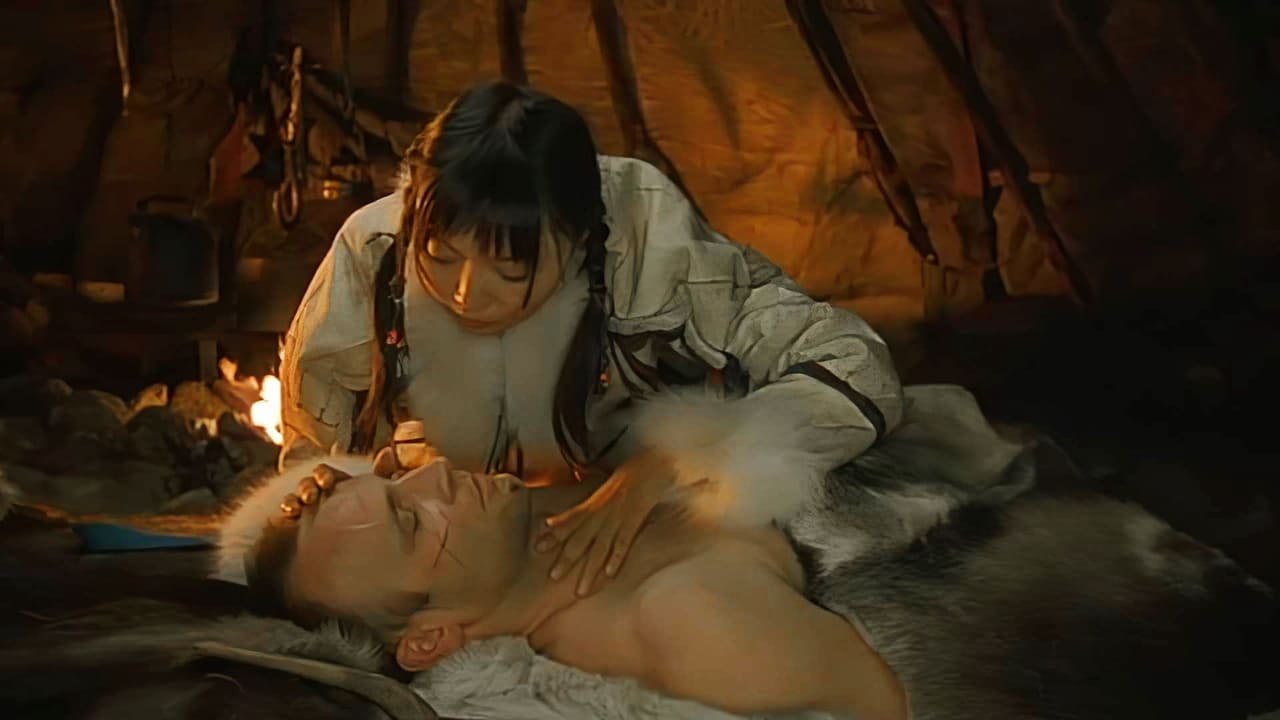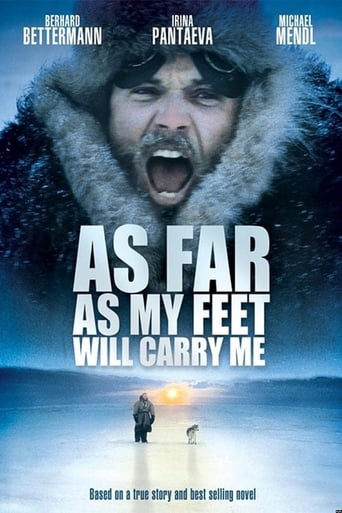

A prisoner escapes from the Gulag in Siberia and walks to freedom in Iran.This movie is watchable and well filmed but the story is too contrived. Any one who has read Solzhenitsyn would find this a candy coated adventure tale for children.It reminds me of a movie made from a book that is doctored to make it PC (politically correct) and more entertaining for the masses. The hero is helped through Siberia by hunters/gold prospectors and nursed back from near death by a native Siberian tribe. The natives are particularly sugary and far fetched. To add some romance he has a liaison with a young native girl.A Jew helps him the most with a passport. The Jew has a sudden heart attack so he doesn't have to turn him it...It is stupid and contrived what more can I say.DO NOT RECOMMEND
... View MoreFilmed with a good budget and production and attention to detail, it has many scenes that could summarily describe this as See the Soviet Republics On Foot travelogue. To make the narrative more attractive to viewers, many dramatic circumstances were re-enacted, which are highly implausible. For example, when walking the bridge on the Iran-USSR border, and meeting with the soviet lager commandante. Or when jumping off the train, and finding himself face-to-face with the commandante.The narrative, too, suffers from an obvious linearity. It would have been much more interesting if it had flashbacks. Andrej Waida comes to mind in using this narrative, specially when merging the new with the old in Poland/Germany locales/stories.The ending is melodramatic. It seems too much of an Hollywood style made-for-TV happy ending. John Turturro in the movie La Tregua, also about the long trip back home after years in the concentration camps, depicts a much more plausible and realistic psychological state of mind. What is depicted in this motion picture is hardly believable, and I am sure some executive producers who had the power to change the original script to make it more conforming to the expectations of the audience masses, made script changes that actually diminished the power of this potentially-strong motion picture."you must learn to trust again" is the best quote of the movie. Too bad characters like the one that said this have not been developed elsewhere in this production.
... View MoreA soldier in combat is a strange beast. I think the word "beast" is a good one for when you take young men or women who are, not at heart, killers and indoctrinate them as to the evils of the "enemy" and then place them in an unbelievable stressful situation in which their lives are in danger every minute they transfer from human to beast. Of course in every war, there are horrific tales of soldiers who go so far that they completely lose any semblance of humanity, but those are the rare cases. Most of them are just trying to survive so that they can return to their families.This film is the true story of one such soldier. He just happens to have been a German soldier in World War II. All he wants to do is survive and return to his wife, daughter, and unborn child. One could easily substitute him with a guy in Iraq today who just wants to live and get back home.The first filming of this story was a mini-series for German television made in 1959. In Germany, it was know as a "street sweeper" in that it was watched by so many people that the streets were basically deserted during the time of its broadcasts.The script is from a novel by Josef Martin Bauer first published in 1955 that Bauer based up interviews with the real man. In the novel and film, the soldier is given the name Clemens Forell.As Far begins at a train station where Forell is leaving for the Russian front and saying goodbye to his wife, who is pregnant, and his daughter. He promises them both that he will return. Next we see him as a prisoner sentenced to twenty-five years of hard labor in Siberia. Needless-to-say, the conditions at the prison camp - provided by weather and sadistic guards - are brutal.Forell is at a slight advantage in that he is a mechanic who can repair the old engine running the power supply. Forell is caught trying to escape and punished by being placed in an isolation cell which is really just a hole in the ground open to the elements. After his time in isolation, he is sent back to the mines where his fellow prisoners beat him almost to death. We find later that they were forced to do so. The commanding officer, who sees something special in Forell, sends him to the infirmary rather than just letting him die. This provides the opportunity for Forell to be helped to escape by the doctor who is also a prisoner.Thus begins an incredible 8,000 mile journey back to home and family. Through sheer guts and determination accompanied by some heartwarming acts of kindness of strangers, Forell completes his journey and is finally reunited with his family.Bernhard Bettermann achieves a brilliant piece of acting in playing Forell. From what I can determine, Bettermann is basically a German television star, but he has the combination of toughness, sensitivity, and good looks that could easily make him a major film star.This is one of those stories that, if you didn't know it were true, you wouldn't believe it. Books and films that depict the almost super-human abilities of men and women to survive harsh treatment and conditions help us to reflect upon the value of life - no matter our current condition. Such stories of real people and their accomplishments are always worthy of attention.
... View MoreThis is a German language film with English subtitles based on the novel by the same name which was based on a true story about a German POW in the aftermath of WWII who escaped a Siberia work camp and made an amazing 8,000-mile trek home to Munich to be reunited with his family.I haven't read the novel, but of course it was a novel and so much of it was made up. It doesn't matter however, since what counts in a movie is simply the movie itself. I am always a little put off when the blurbs for a film scream out: "Based on a true story!" So what? Sometimes that's significant and sometimes it isn't. In this case the fact that there actually existed a German POW who managed such an amazing escape is important. The exact details of what happened to him would be wonderful to have. But in lieu of that, we do have this wonderful movie.Bernhard Bettermann stars as Clemens Forell, and he is perfect for the part. To survive such an epic adventure the person has to be strong of body and strong of will. Bettermann looks as though he could actually do something like this, except for the fact that he is so tall and pale I suspect he would stand out and be easily identified as a foreigner in those strange lands through which he trekked. Also a bit not so realistic is the Soviet camp commander who personally chases Forell all the way to the Iranian border (although that resulted in a nice ironic scene on the bridge at the border between Iran and what--I think--is Turkmenistan). In reality there were probably several Soviet officers who played that part. And I would also liked to have seen a little more about how he found enough to eat. And finally it is clear that the last parts of his journey were sped up a bit as though the filmmakers were in a hurry. But these are small quibbles.I don't know if this "coloration" (as I will call it) was in the book, but what director Harvey Martins does is make the tall and "Aryan" Forell experience some of the same horrors that the Jews experienced. In the beginning he is in a cattle car and nearly starved to death as he is taken to the Siberian lead mines. He is in rags and nearly frozen and gets kicked around by sadistic soldiers. If you saw just this part of the movie you would swear it was about the Jews being sent to a concentration camp. In the camp after Forell is caught in an early escape attempt he is shown being beaten by his fellow soldiers, who of course, were punished because he tried to escape. This was exactly the sort of thing the Nazis did in the occupied countries during WWII—if a single German was killed, that killing would be revenged many times over. Later, one of the people who helped Forell is a Jew who lost relatives to the Nazis. Nonetheless he helps Forell, and in doing so demonstrates not only a superior morality, but the kind of courage that is rare. And why did he do it? Because that is the kind of person he is, and that is the kind of persons we all should be.While Forell is a positive, even a heroic figure, and a nice change for Germans who have to endlessly read about and see Germans portrayed in a most negative way throughout their whole lives, the movie itself tends to be neutral politically.The scenes of the snow and the forests and the various places that Forell travels through are nicely done. The ending is exquisite and brought me to tears.(Note: Over 500 of my movie reviews are now available in my book "Cut to the Chaise Lounge or I Can't Believe I Swallowed the Remote!" Get it at Amazon!)
... View More